
The Continuation War, also known as the Second Soviet-Finnish War, was a conflict fought by Finland and Nazi Germany against the Soviet Union during World War II. It began with a Finnish declaration of war and invasion on 25 June 1941 and ended on 19 September 1944 with the Moscow Armistice. The Soviet Union and Finland had previously fought the Winter War from 1939 to 1940, which ended with the Soviet failure to conquer Finland and the Moscow Peace Treaty. Numerous reasons have been proposed for the Finnish decision to invade, with regaining territory lost during the Winter War regarded as the most common. Other justifications for the conflict include Finnish President Risto Ryti's vision of a Greater Finland and Commander-in-Chief Carl Gustaf Emil Mannerheim's desire to annex East Karelia.

Finland, officially the Republic of Finland, is a Nordic country in Northern Europe. It borders Sweden to the northwest, Norway to the north, and Russia to the east, with the Gulf of Bothnia to the west and the Gulf of Finland to the south, opposite Estonia. Finland covers a total area of 338,145 square kilometres (130,559 sq mi), including a land area of 303,815 square kilometres (117,304 sq mi), and has a population of 5.6 million. Helsinki is the capital and largest city. The vast majority of the population are ethnic Finns. The official languages are Finnish and Swedish; 84.9 percent of the population speak the first as their mother tongue and 5.1 percent the latter. Finland's climate varies from humid continental in the south to boreal in the north. The land cover is predominantly boreal forest biome, with more than 180,000 recorded lakes.

Helsinki is the capital and most populous city in Finland. It is on the shore of the Gulf of Finland and is the seat of southern Finland's Uusimaa region. About 675,000 people live in the municipality, with 1.25 million in the capital region and 1.58 million in the metropolitan area. As the most populous urban area in Finland, it is the country's most significant centre for politics, education, finance, culture, and research. Helsinki is 80 kilometres (50 mi) north of Tallinn, Estonia, 360 kilometres (220 mi) north of Riga, Latvia, 400 kilometres (250 mi) east of Stockholm, Sweden, and 300 kilometres (190 mi) west of Saint Petersburg, Russia. Helsinki has significant historical connections with these four cities.

Scandinavia is a subregion of Northern Europe, with strong historical, cultural, and linguistic ties between its constituent peoples. Scandinavia most commonly refers to Denmark, Norway, and Sweden. It can sometimes also refer to the Scandinavian Peninsula. In English usage, Scandinavia is sometimes used as a synonym for Nordic countries. Iceland and the Faroe Islands are sometimes included in Scandinavia for their ethnolinguistic relations with Sweden, Norway and Denmark. While Finland differs from other Nordic countries in this respect, some authors call it Scandinavian due to its economic and cultural similarities.

The Winter War was a war between the Soviet Union and Finland. It began with a Soviet invasion of Finland on 30 November 1939, three months after the outbreak of World War II, and ended three and a half months later with the Moscow Peace Treaty on 13 March 1940. Despite superior military strength, especially in tanks and aircraft, the Soviet Union suffered severe losses and initially made little headway. The League of Nations deemed the attack illegal and expelled the Soviet Union from its organization.
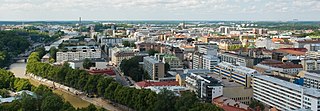
Turku is a city in Finland and the regional capital of Southwest Finland. It is located on the southwestern coast of the country at the mouth of the River Aura. The population of Turku is approximately 202,000, while the metropolitan area has a population of approximately 311,000. It is the 6th most populous municipality in Finland, and the third most populous urban area in the country after Helsinki and Tampere.
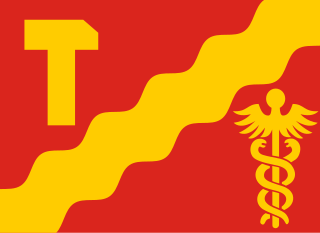
Tampere is a city in Finland and the regional capital of Pirkanmaa. It is located in the Finnish Lakeland. The population of Tampere is approximately 255,000, while the metropolitan area has a population of approximately 417,000. It is the 3rd most populous municipality in Finland, and the second most populous urban area in the country after the Helsinki metropolitan area.

The Grand Duchy of Finland, officially and also translated as the Grand Principality of Finland, was the predecessor state of modern Finland. It existed between 1809 and 1917 as an autonomous state within the Russian Empire.
Finns or Finnish people are a Baltic Finnic ethnic group native to Finland.

The Finland national football team represents Finland in men's international football competitions and is controlled by the Football Association of Finland, the governing body for football in Finland, which was founded in 1907. The team has been a member of FIFA since 1908 and a UEFA member since 1957.
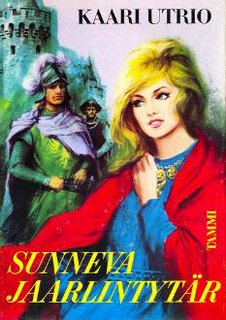
Sunneva Jaarlintytär is a historical novel by Finnish author Kaari Utrio.

Vaskilintu is a 1992 historical novel by Finnish author Kaari Utrio. It is set in 11th century Europe. Vaskilintu and Tuulihaukka (1995) are considered to be Utrio's most important works.

Finnish is a Finnic language of the Uralic language family, spoken by the majority of the population in Finland and by ethnic Finns outside of Finland. Finnish is one of the two official languages of Finland, alongside Swedish. In Sweden, both Finnish and Meänkieli are official minority languages. Kven, which like Meänkieli is mutually intelligible with Finnish, is spoken in the Norwegian counties of Troms and Finnmark by a minority of Finnish descent.
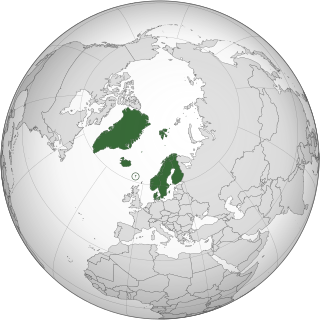
The Nordic countries are a geographical and cultural region in Northern Europe and the North Atlantic. It includes the sovereign states of Denmark, Finland, Iceland, Norway and Sweden; the autonomous territories of the Faroe Islands and Greenland; and the autonomous region of Åland.
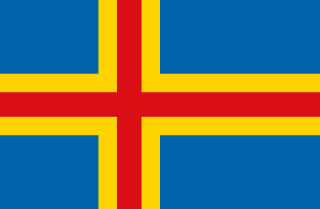
Åland is an autonomous and demilitarised region of Finland. Receiving its autonomy by a 1920 decision of the League of Nations, it is the smallest region of Finland by both area (1,580 km2) and population (30,129), constituting 0.51% of Finland's land area and 0.54% of its population. Its only official language is Swedish and the capital city is Mariehamn.
Sunneva Einarsdóttir is an Icelandic team handball goalkeeper. She plays on the Icelandic national team, and participated at the 2011 World Women's Handball Championship in Brazil.
The following lists events that happened in 1990 in Iceland.

Sanna Mirella Marin is a Finnish former politician who served as prime minister of Finland from 2019 to 2023 and as the leader of the Social Democratic Party of Finland (SDP) from 2020 to 2023. She was a Member of Parliament from 2015 to 2023. She was re-elected as member of parliament in April 2023 but resigned to become a strategic adviser on political leaders' reform programmes in the Tony Blair Institute in September 2023.

Utgard is the fifteenth studio album by Norwegian extreme metal band Enslaved, released 2 October 2020 by Nuclear Blast.
















